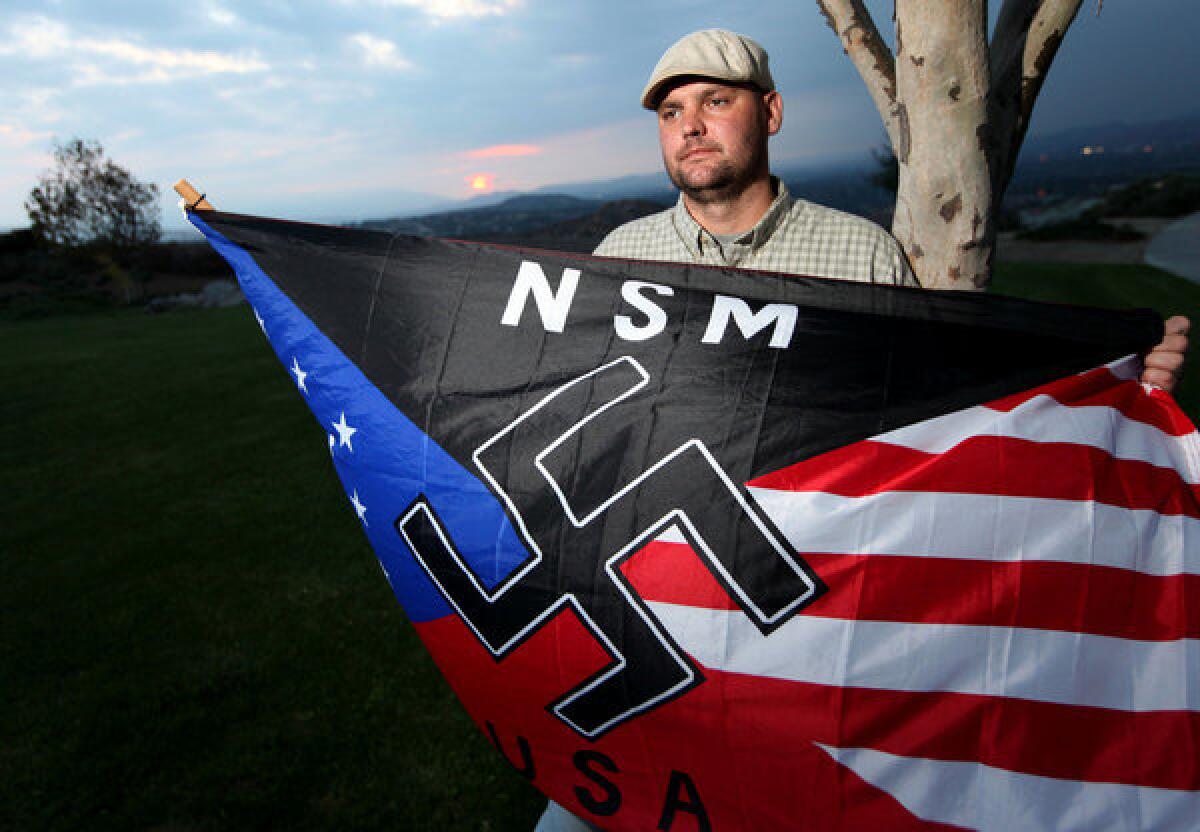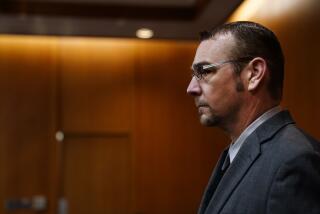Judge set to rule on placing boy who killed neo-Nazi father

Both sides agreed that the boy was troubled, and that he had endured a lot in his 13 years -- being subjected to abuse and enveloped in a world of bigotry.
But they diverge on how to place the boy, who was found guilty of killing his father, a neo-Nazi, shooting him in the head as the man slept on a couch in the living room two years ago.
During three days of arguments and testimony in a Riverside courtroom that concluded Wednesday, prosecutors maintained that he should be placed in a state-run juvenile facility. His attorneys countered that he is disabled, emotionally and socially, and requires more if he is to be rehabilitated by the time he’s an adult.
Judge Jean P. Leonard said she would announce her decision Thursday, marking the end of a process the boy’s grandmother -- and mother of the slain father -- called “our walk through hell.”
“There’s no peace for any of us,” JoAnn Becker said in the statement that was read by prosecutors Wednesday in court. Becker sat in the Riverside courtroom just a few rows behind her grandson, the sandy-haired boy with black glasses, who fidgeted throughout the proceedings.
“He needs both quality and secure placement,” she said in the statement.
A judge previously found that the boy, who was 10 when the crime happened, possessed the mental capacity to know that killing his father, Jeffrey Hall, was wrong. He was found guilty of second-degree murder and using a gun while committing a felony. The boy, charged as a juvenile, can be held in state custody until he is 23. The Times is withholding his identity because of his age.
During his closing arguments, Chief Deputy Dist. Atty. Michael Soccio said the boy has demonstrated a propensity for violence beyond killing his father, calling it a “hallmark of his early life.” Soccio recounted instances of aggression, including attacking teachers. He said that had continued during the two years he has been incarcerated.
At a facility in Stockton where he stayed, officials there testified that when another youth threw water on his bed, the boy retaliated by throwing urine onto his.
Despite that, officials at the on-site school said, they were able to accommodate him, even though he was the youngest student, an eighth-grader among high schoolers. They noted that he was finding his place among fellow students.
“He fits in very nicely,” testified Krys Hunter, a psychologist with the Department of Corrections.
The boy’s lawyers agreed that it’s crucial that the boy be placed in a secure, highly structured environment. But he also needs more than what the facility can offer him.
Jose Fuentes, a neuropsychologist who had observed the boy, testified that he was fidgety, requiring considerable physical activity and the opportunity to move around on a frequently -- potentially hourly -- basis.
The boy’s attorney, Punam Grewal, said he would have to overcome social and emotional difficulties as well as years of abuse. She said that he had problems with his speech and vision, and would have to reprogram himself after being raised amid hatred and violence. (During his incarceration he has a record of using racial slurs and making offensive statements to teachers.)
“He needs treatment for that, extensive treatment,” she said. “That’s his vocabulary. That’s how he perceives the world, and we have to change that.”
She contends that he needs counseling and a program that offers him limited exposure to the outside world to better prepare him for adulthood.
“We need to do something better,” Grewal said, adding that when he emerges from custody, “we don’t want him to come back.”
[For the Record, 6:35 p.m. PDT Oct. 30: An earlier version of this post incorrectly identified Punam Grewal as a neuropsychologist who had observed the boy whose placement is being determined at the hearing. Jose Fuentes is the neuropsychologist; Grewal is the boy’s attorney.]
ALSO:
Sierra Madre pig would be cooked in Seal Beach
Driver cited for wearing Google Glass may be first in California
Former Lancaster embalmer accused of stealing gold crowns from bodies
Twitter: @rar
More to Read
Sign up for Essential California
The most important California stories and recommendations in your inbox every morning.
You may occasionally receive promotional content from the Los Angeles Times.









